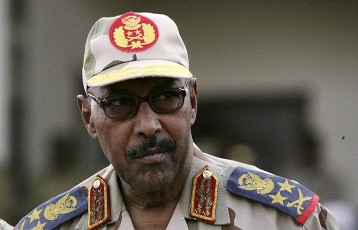Sudan defense minister under pressure to resign over Heglig’s takeover
April 14, 2012 (KHARTOUM) – The Sudanese national assembly, that is dominated by the ruling National Congress Party (NCP), will soon summon defense minister Abdel-Rahim Mohamed Hussein to probe him on circumstances surrounding the fall of Heglig at the hands of South Sudan’s army.

“We summoned the defense minister and we will hold him to account. Nothing will go by without scrutiny,” Omer said at the Sayed Ahmed Khalifa forum in Khartoum.
Abdel-Rau’f Babiker Sa’ad, an NCP MP, revealed that that the party’s parliamentary bloc held a meeting led by presidential adviser Ghazi Salah al-Deen at the heels of Hussein’s briefing this week in which they directed heavy criticism at the top military official.
They called on the presidency to relieve Hussein of his duties after his recent failure in protecting the oil-rich region of Heglig which produces half of Sudan’s crude output.
Sa’ad said they intend to press with this issue even of it led to disagreement with the presidency.
The Sudan Armed Force (SAF) claimed on Saturday that they are in control of the region of Heglig but not the town. Its spokesman Al-Sawarmi Khalid Sa’ad said that they want to annihilate South Sudan’s forces and not simply reclaim the town back.
The spokesman of Sudan People Liberation Army (SPLA) of South Sudan dismissed SAF assertions saying that the area remains under their control.
South Sudan VP Riek Machar said on Friday that battles are raging between the two sides north of Heglig.
The delay in taking back Heglig and continuous promises by Khartoum that they will do so in the coming hours has frustrated many citizens.
Many are questioning president Omer Hassan al-Bashir’s insistence to keep him despite his poor performance. They note the attack on the capital by Darfur Justice and Equality Movement (JEM) in 2008 which rattled the army at the time despite quickly repulsing it.
It was reported that Bashir swiftly rejected calls that he sack Hussein telling members of his party that it is a “red line”. Like Bashir, Hussein has also been indicted by the International Criminal Court (ICC) for alleged crimes in Sudan’s western Darfur region.
In 2003, al-Bashir appointed Hussein as his special representative for Darfur, a position he held until 2004. It was the policies he implemented in Darfur at this time that would later lead the ICC to issue a warrant for Hussein’s arrest.
In December 2011, the prosecutor of the ICC Luis Moreno-Ocampo asked the judges to order the arrest of Hussein saying that he is among those who “bear greatest criminal responsibility” for atrocities in the Sudan’s western region of Darfur from August 2003 to March 2004 at the height of the conflict.
The ICC stated on 1 March 2012 that there were sufficient grounds to hold Hussein responsible for 20 counts of crimes against humanity, including persecution and rape, and 21 counts of war crimes, including murder and attacks on civilians.
Nevertheless, Hussein continues to be regarded as one of the most powerful figures within the regime.
Moreover, he has recently been faced with a great deal of dissent amongst senior army officers who have demanded that the Sudan Armed Forces be made more independent from the NCP.
(ST)
Al Jazeera English | Sudan army advances on disputed oil town | 13 April 2012
The Sudanese army says it is advancing on the town of Heglig, days after the South Sudanese army captured it.
